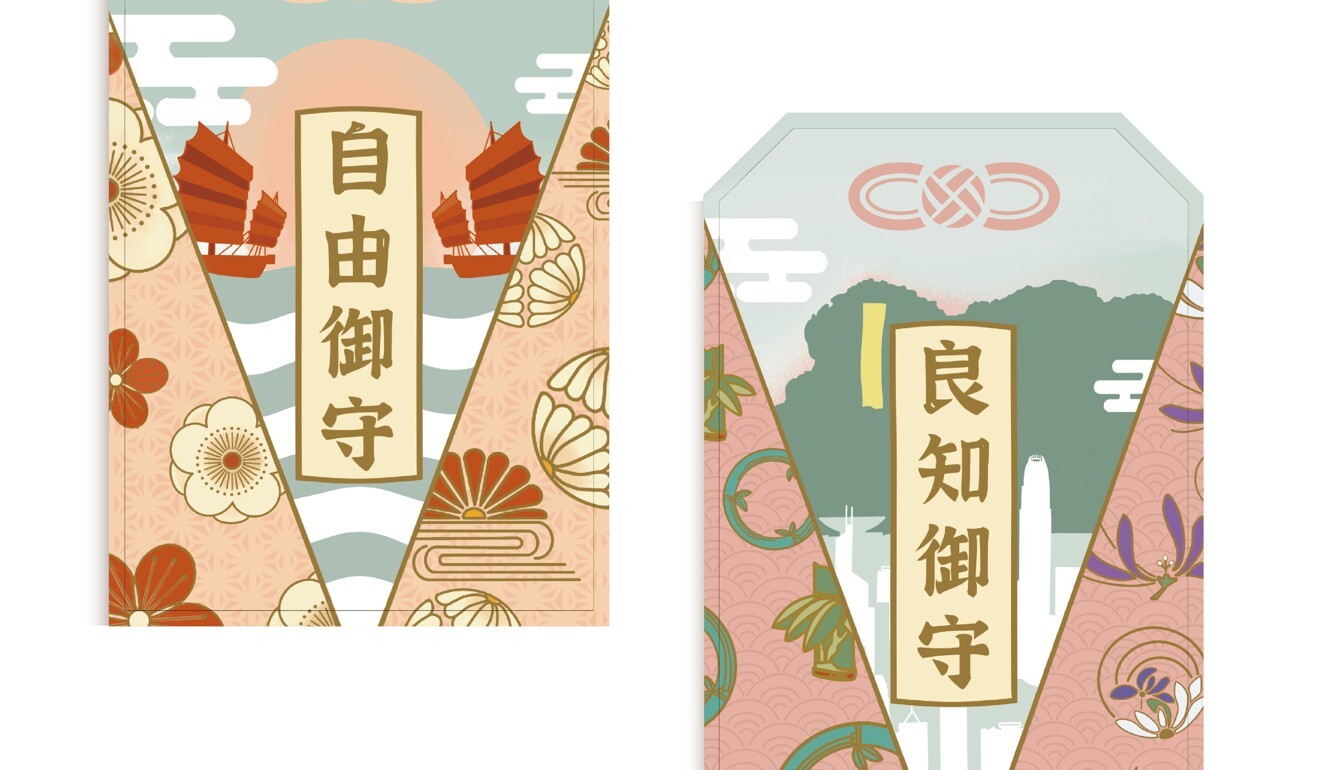
Lunar New Year: mindful of national security law, Hong Kong festival market stalls opt for subtle messages on products
- Fewer fairs run by anti-government groups this year, and stallholders are staying clear of taboo slogans
- Despite muted mood, designers get creative to put out products carrying a ‘yellow’ message
Shoppers who took a closer look, however, could spot cushions bearing a one-word message – “Conscience” – and smartphone cases that read “Hong Kong”.
“We don’t need to put ‘Liberate Hong Kong’ on our designs,” said Yanny Wong, a vendor in her 20s who produced a set of red packets for supporters of the city’s opposition camp. “Instead, we have ‘Defend freedom’ and ‘Defend conscience’ on the red packets this year. People will still understand.”
Independent Lunar New Year fairs which sprout up at this time every year have traditionally been a gathering point for politicians, various organisations, independent artists and product designers to spread anti-establishment messages and raise funds by selling products that mock the government or bear protest slogans.

The slogan “Liberate Hong Kong, revolution of our times” – deemed a separatist call by the authorities – has become taboo since some protesters were arrested under the new law for carrying products bearing those words.
Wong said the “yellow” community of those who supported the anti-government movement had developed into a spirit which did not necessarily need slogans.
“Certainly the national security law is worrying, as you never know if the government will spot your products,” she said. “But it also boosts our creativity as we learn to be flexible and dynamic.”
Wong and a friend produced more than 1,000 sets of red packets, even though the Covid-19 pandemic might dampen sales as people may not be visiting one another as much over the festive season this year.
“We will continue to make protest-relevant accessories and products in future,” she said.
Opposition activists detained in mass security law arrests have bail extended
Unlike last year, when festive markets organised by protest supporters mushroomed across Hong Kong, only a few can be found this year.
Sarah*, an organiser of an independent Lunar New Year fair in Kowloon, told the Post: “We will just organise a normal festive market this year, to offer a place for some independent artists to sell their products. We involve many yellow shops in our market, but our vendors are not selling politically related products.”
At government-organised fairs across the city, the authorities banned the sale of dry goods such as toys, decorations and T-shirts last year because of the social unrest. The ban remains in place, with authorities citing the pandemic this year.
Some political groups that have been fixtures at the annual markets experienced setbacks even before this year’s fairs opened.
For the first time in 32 years, the organiser of Hong Kong’s annual June 4 Tiananmen vigil was ordered by the authorities last Saturday to close its stall at a government-run flower market in Victoria Park, in Causeway Bay.

The Hong Kong Alliance in Support of Patriotic Democratic Movements of China posted a banner at the booth it shared with the Justice Defence Fund saying: “Vindicate June 4, fight to the end.”
The authorities accused it of breaching lease conditions by putting up materials unrelated to flower sales.
In previous years, former lawyer Cyd Ho Sau-lan, a trustee of the Justice Defence Fund, would be at the booth writing auspicious wishes for good luck and prosperity on Chinese fai chun, the calligraphic scrolls hung up at doorways over the Lunar New Year.
“This year, we were banned from doing so before we started running the stall,” she said, adding that the group was not surprised, given the authorities’ recent clampdown on political activities. “We know we have to be flexible.”
Hong Kong district councillors face disqualification if probes find them unpatriotic
The Justice Defence Fund was set up to provide financial aid to opposition activists and lawmakers facing legal action.
Ho found an alternative venue for her calligraphic services, working out of a district councillor’s office in Wan Chai.
“Ideally you can ask me to write any message on the lucky paper. But if you ask me to write ‘Hong Kong independence’, I will refuse,” she said.
She expected the markets to be quieter this year with the ban on political and other products. “With the national security law, young people might be more careful to avoid getting into trouble. That’s understandable,” she said.
Former opposition lawmaker Shiu Ka-chun is also keeping a low profile this year.
He recently set up a new organisation, Wall-fare, to advocate for the rights of inmates. His group is selling Chinese pastries to raise funds and will be sending pastries to the families of inmates.

“We are just selling pastries online and at yellow shops. We no longer write any slogans or messages in our products,” he said.
Shiu said the group faced a setback when it sent reply slips to the prisons to ask inmates if they would like their families to receive the festival gifts.
“The Correctional Services Department doubted our intentions and said due to security reasons it would not allow such a collective action,” he said. “Even a reply slip asking inmates to select pastries was not allowed.”
Shiu said his group had been careful to minimise any action that might end up affecting the inmates, and remained aware of the “red lines” in Hong Kong now.
“When our volunteers write letters to encourage them in prisons, we delete slogans and words that are sensitive,” he said. “We had better be careful if we want to continue our work.”
* Name changed at interviewee’s request.

